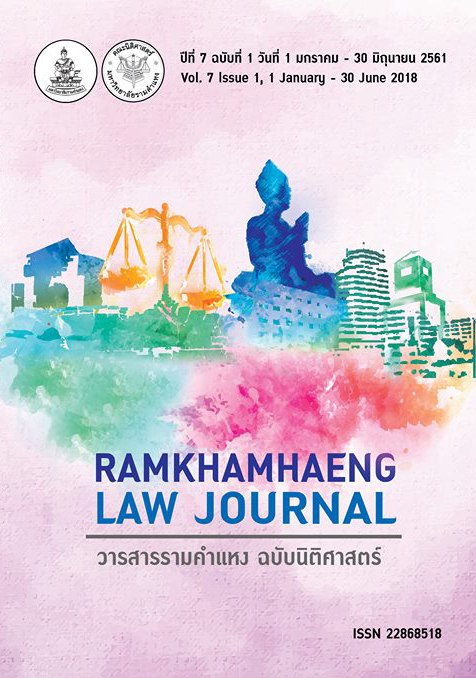การใช้เอกลักษณ์ของบุคคลในวิดีโอเกมของประเทศสหรัฐอเมริกา: หลักการใช้โดยเปลี่ยนรูปใหม่
Main Article Content
Abstract
The right of publicity is rooted in the right of privacy or the right to be left alone. Publicity rights aim to protect an individual from other people using the individual’s likeness or persona without consent. Celebrities such as athletes, performers, or singers should have the right to protect their identities from those who would use their persona and fame for commercial purposes. Today’s videogame technology allows game developers to create avatars by using the likenesses or personas of celebrities in the videogame’s content. Players are able to be their favorite real-life avatars in the game. This is not yet the case in Thailand. This paper studies the decision of a U.S. court regarding the right of publicity in the area of videogames. The case promulgates transformative use test to be used as one of the balancing tests between the right of publicity and First Amendment freedom of expression under the Constitution.
Article Details
References
อำนาจ เนตยสุภา และชาญชัย อารีวิทยาเลิศ. คำอธิบายกฎหมายลิขสิทธิ์. พิมพ์ครั้งที่ 2. กรุงเทพมหานคร: สำนักพิมพ์วิญญูชน, 2558.
Amin, Reshma. “A Comparative Analysis of California's Right of Publicity and the United Kingdom's Approach to the Protection of Celebrities: Where Are They Better Protected.” Case Western Reserve Journal of Law, Technology & the Internet 1, 2 (2010): 97.
B, Nimmer M. “The Right of Publicity.” Law and Contemporary Problems 19 (1954): 216.
Entertainment Software Association, 2017 Sales Demographic and Usage Data: Essential Facts about The Computer and Video Game Industry [Online]. Available URL: https://www.theesa.com/wp-content/themes/esa/assets/EF 20 17_Design_FinalDigital.pdf, 2017 (August, 29).
E, Torres. “The Celebrity Behind the Brand International Protection of the Right of Publicity.” Pace Intellectual Property, Sports & Entertainment Law Forum 6 (2016): 118.
G, Hylton J. “Baseball Cards and the Birth of the Right of Publicity: The Curious Case of Haelan Laboratories v. Topps Chewing Gum.” Marquette Sports Law Review 12 (2001): 283-284.
J, Dougherty F. “Foreword: The Right of Publicity—Towards a Comparative and International Perspective.” Loyola of Los Angeles Entertainment Law Review 18 (1998): 423.
J, Rosenzweig B. “A Change of Hart: An Argument Favoring the Transformative Use Test in Right-of-Publicity Cases.” Suffolk University Law Review 48 (2015): 240.
M, Blanke J. “No Doubt About It - You've Got to Have Hart: Simulation Video Games May Redefine the Balance Between and Among the Right of Publicity, the First Amendment and Copyright Law.” BostonUniversity Journal of Science & Technology Law 19, 26 (2013): 67.
M, Edelman. “Closing the “Free Speech” Loophole: The Case for Protecting College Athletes’ Publicity Rights in Commercial Video Games.” Florida Law Review 65 (2013): 560.
O, Sweeney G. and Williams, J. T., “Mortal Kombat: The Impact of Digital Technology on the Rights of Studios and Actors to Images and Derivative Works.” Minnesota Intellectual Property Review 3 (2002): 103.
Prosser, William L. “Privacy.” California Law Review 48, 3 (1960): 389.
Warren, Samuel D. and Louis D. Brandeis. “The Right of Privacy.” Harvard Law Review 4 (1890): 193, 216.
Authors Guild v. Google, Inc. No. 13-4829 (2d Cir. 2015).
Comedy III Productions v. Gary Saderup, Inc., 21 P.3d 797 (Cal. 2001).
Comedy III Productions v. Gary Saderup, Inc., 807-808.
Hilton v. Hallmark Cards, 599 F.3d 894, 909 (9th Cir. 2010).
Haelan Laboratories, Inc. v. Topps Chewing Gum, Inc, supra note 19, 868.
Haelan Laboratories, Inc. v. Topps Chewing Gum, Inc., 202 F.2d 866 (2d Cir. 1953).
Kirby v. Sega of America, Inc., 50 Cal.Rptr.3d 607 (2006).
No Doubt v. Activision Publishing, Inc., 192 Cal.App.4th 1018 (2011).
Pesina v. Midway Manufacturing Co., supra note 28, 42.
Pesina v. Midway Manufacturing Co., 948 F. Supp. 40 (N.D. Ill. 1996).
Winter v. DC Comics 69 P.3d 473 (Cal. 2003).
17 U.S. Code § 106.

